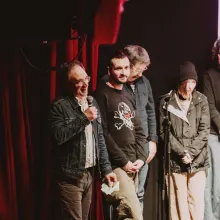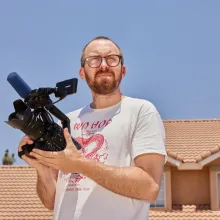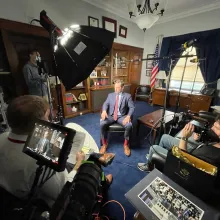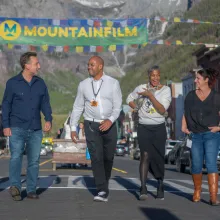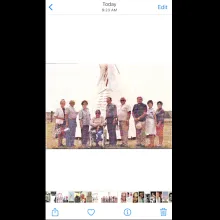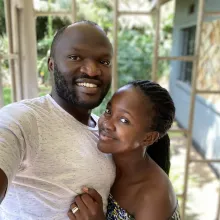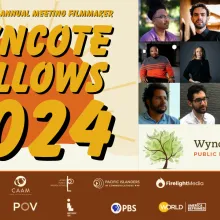Berwick Film and Media Arts Festival takes place in Berwick-upon-Tweed, the most northerly town in England, resting near the border to Scotland and where the River Tweed meets the sea. The festival places site-specific installations within this setting and has risen to prominence in a way that many festivals outside of cities struggle to achieve, attracting audiences from across the United Kingdom. In past editions, it spotlighted international filmmakers, including Peggy Ahwesh, Sky Hopinka, Shireen Seno, John Torres, and this year, Basma al-Sharif. At the same time, the festival has
Latest Posts
In September 2020, amidst a global pandemic, the government of India passed three farm laws which met with resistance. Nishtha Jain’s new documentary Farming the Revolution chronicles the resulting farmers’ protest, from 2020–2021; the contentious agricultural reforms, pertaining to regulating the pricing and sale of farm produce, were peddled as beneficial but viewed as exploitative by the farmers. Indian farmers, especially from the agrarian states like Punjab and Haryana, staged widespread protests against the Bharatiya Janata Party (BJP), which has been in power since 2014, by marching up
How To With John Wilson is an 18-part series of comedic documentary essays framed as tutorials. In each episode, filmmaker John Wilson poses a question that is also the episode title, like How To Make Small Talk or How To Throw Out Your Batteries. The questions are very rarely answered directly, instead offering a free-associative portal into both Wilson’s life and those of the people he meets.
The Asian American Documentary Network, colloquially known as A-Doc, announces nine participants across two funding initiatives: the Our Stories, Our Voices Microdocs series, and the inaugural Impact Fellowship. The third A-Doc-produced microdocs series, Our Stories, Our Voices , will consist of six 2-minute short documentaries on the 2024 U.S. elections and civic engagement. According to a press release, selected filmmakers will receive $3,000 in production funding plus another $750 in “impact support to create and conduct an impact campaign leading up to November, in partnership with
On Christmas Eve of 1989, a pregnant mother of nine named Imelda Bbaale was inexplicably shot and killed in her home. It was a shocking tragedy that forced Imelda’s husband to flee with his young children to a different continent with the murder remaining unsolved. Nearly a quarter century on, Imelda’s daughter Patricia Bbaale Bandak gave birth to her own baby girl (also Imelda) on that very same horrible yet holy date. The coincidence catalyzed Bandak, now an acclaimed Ugandan-Danish filmmaker, to return to her native land to seek answers—less about the circumstances surrounding her mother's
If Alex Garland's fictional film about a hypothetical new American Civil War feels insufficiently political, Charlie Sadoff's Against All Enemies, warning of the ways a real one could come about, may be more suitable. Now on VOD, and burning up the iTunes charts, Against All Enemies is produced by the liberal PAC Meidas Touch, Restrepo (2010) director Sebastian Junger, Ken Harbaugh, and Sadoff.
SECTION 1: Julian When I began the lengthy process of reporting and directing my feature documentary, The Holly (2022), there were plenty of indications of potential pitfalls. The story involved a gang shooting case, possible police corruption, and a historic community on edge from a rash of shootings, an ongoing effort to gentrify it, and decades of mistreatment by powerful forces in Denver. Still, I didn’t imagine that just as we were preparing to launch the film’s festival run that my entire team would be served legal papers at their homes in a defamation lawsuit that threatened to derail
The question of how to build a more open and equitable film festival is an old and still pressing concern. Ideally, there will be a plurality of answers and the Berwick Film & Media Arts Festival may be one of them. Its 2024 edition, which ran 7–10 March, felt like a festival whose program was not only deeply engaged with larger political struggles, but also open and malleable in a way that many festivals claim but rarely enact in the relations underpinning the screenings.
What would life be like in America? By the time we fled Uganda, there had been two attempted kidnappings of my wife, Nulu. I had been shot in the face at close range while filming, arrested, thrown in a crammed police cell, and denied access to a lawyer.
American Documentary, the nonprofit organization behind POV, POV Shorts , and America ReFramed , announces the 12 selected Wyncote Fellows who will attend the PBS Annual Meeting in a curated program. A unique opportunity that introduces filmmakers to the labyrinthian world of the PBS Annual Meeting, the seventh annual Wyncote Fellowship is coordinated by AmDoc in collaboration between PBS Indies partners POV , Firelight Media, ITVS, Reel South, America ReFramed , WORLD, and the five organizational members of the National Multicultural Alliance: Black Public Media, Center for Asian American
